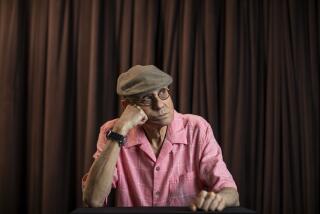Double Dutch Treat by Elmore Leonard (Arbor House: $17.95; 542 pp.) : THE HUNTED by Elmore Leonard (Mysterious: $3.95, paperback; 256 pp.)
- Share via
Elmore Leonard has published 19 books in the last 20 years or so, beginning with Westerns, then switching to thrillers (with occasional combinations of the two). From the first, Leonard’s work was marked by razor-sharp characterizations, wonderful dialogue, quirky humor, and the sort of seductive plots and movie-style editing that allowed little time for questions. The minor players are as interesting as the stars, and Leonard prides himself on getting the details right. He can render a human being’s entire life in a few sentences of wardrobe description, with the effect not so much of a shock as a chuckle of recognition.
Now that Leonard is a best-selling author, hailed by critics, readers and news weeklies as a master of contemporary crime fiction, his earlier works are finding new life between hard covers. Three of the writer’s less-well-known books were collected last year by Arbor House in “Elmore Leonard’s Dutch Treat” (“Dutch” being Mr. Leonard’s nickname). “Double Dutch Treat” is another gathering of vintage Leonards; the novels included are “City Primeval: High Noon in Detroit” (first published in 1980), “The Moonshine War” (written in 1969) and “Gold Coast” (also from 1980).
In “City Primeval,” an acting homicide lieutenant named Raymond Cruz engages in a battle of wits and nerves with a psycho killer from Lawton, Okla., named Clement Mansell. Their stalking duel is set in the streets of modern Motown, but the rationale is right out of Dodge City. Leonard renders the thought processes of all his characters with remarkable ease, and events move to their violent conclusion with inevitability and a kind of giddiness not unlike a giggling fit at the edge of a cliff.
The psycho killer thug is one of Leonard’s specialties, and almost all of his books include one. In “Gold Coast,” his name is Roland, and he wears cowboy hats and the sort of loud suit that “makes you close your eyes.” Roland has been given the job of enforcing the vindictive proviso in a Florida mobster’s will that stipulates his widow not be allowed further romance. Roland’s mind is soon inflamed with schemes to turn this situation to his own advantage. Attempting to rescue the widow from her predicament is a likable fellow named Maguire, a former small-time crook now working as an announcer at a marine animal show. Meanwhile, the widow, Karen, has her own plans to resolve matters, plans that intersect the others’ actions with fatal irony.
Sandwiched between these two modern tales is a period piece called “The Moonshine War,” set in east Kentucky in 1931. The central figure here is Son Martin, a country fellow sitting atop 158 barrels of premium corn whiskey. Covetous of this fabled cache is the disingenuous Frank Long, Son’s old Army “buddy,” who turns up now in his new job of revenue agent. When Son refuses to turn over the whiskey, the crooked revenuer “deputizes” a criminal gang (more psycho thugs) to set Son’s fellow moonshiners against him. “The Hunted,” part of 1985’s hardcover “Dutch Treat,” first appeared in 1977; it’s now available in a new paperback edition. Another contemporary thriller, it takes place in Israel, where a 50-year-old mortgage broker named Al Rosen is living out a pleasant early retirement after testifying against some Mob figures back in Detroit. Caught in a hotel fire during an afternoon dalliance, Rosen leads several people to safety, and a wire service photograph of him appears back in the States. Quicker than you can say “witness protection program,” the Boys are after him, and Rosen has to act fast to stay alive. Add a beautiful young woman, a soldier of more-or-less good fortune, a large stash of cash--and once more, Elmore Leonard proves he has few peers in unfolding this sort of story.
Like its predecessor, the omnibus “Double Dutch Treat” should prove a welcome volume both to longtime appreciators of the author and to more recent readers. Perhaps these “Treats” will be an annual occurrence for a while. The idea seems such a natural, one wishes for similar collections of the early efforts of other maestros of the modern thriller.
Ross Thomas, anyone?
More to Read
Sign up for our Book Club newsletter
Get the latest news, events and more from the Los Angeles Times Book Club, and help us get L.A. reading and talking.
You may occasionally receive promotional content from the Los Angeles Times.










